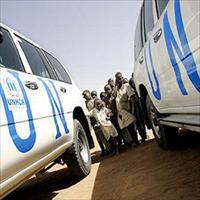SOMALIA: "Seize window of opportunity to bring peace"

The international community should seize a window of opportunity, despite the difficult security and humanitarian situation in Somalia, to bring peace to the war-ravaged country, the UN has said.
Recent assessments, UN Secretary-General Ban Ki-moon said, had shown that despite the difficult security situation characterised by indiscriminate killing, kidnapping and hijacking, an opportunity exists to end the prolonged conflict in Somalia and the suffering of its people.
"In total, the United Nations estimates that 700,000 people were displaced from Mogadishu and its environs during 2007," Ban said in a report issued on 18 March. "The vast majority of them are fleeing from the ‘war zone’ in the capital to the ‘hunger zone’ in the Lower and Middle Shabelle regions."
The report stated that an assessment by the Integrated Task Force on Somalia - headed by the UN's Department of Political Affairs - had advocated a three-track approach to attaining peace and stability.
First would be a political track leading to dialogue between the Transitional Federal Government (TFG) and the opposition and second, a credible security presence. Third would be to increase UN programmes to bolster the economy and provide basic services.
"Robust support of the ongoing political process could lead to improved security conditions," Ban noted. "I particularly call on all parties to protect the civilian population and abstain from harming or kidnapping humanitarian workers and other expatriates working in Somalia."
Timothy Othieno, a regional analyst at the Overseas Development Institute in London, welcomed the report and told IRIN: “Unconditional negotiations between the TFG and the opposition need to take place in a genuine spirit of reconciliation. And this process should be followed by a comprehensive security mechanism with guarantees to ensure that a ceasefire is upheld. Only then can the increase of programmes by the UN and its agencies take place.
“So the question whether the deployment of a UN force will help the situation rightfully depends on the success of the underlying processes. These three tracks need to precede any deployment of any UN troops. In a sense, the UN needs to have the support of the major players on the ground (TFG and the opposition) in carrying out their mandate. Failure to do so would [endanger] a possible repeat of the catastrophic UN involvement of the early 1990s.”
Four scenarios identified by the report could lead to the possible deployment of a UN peacekeeping force: relocation of UN staff from Nairobi to Somalia; relocation of the UN Political Office for Somalia; deployment of an impartial stabilisation force and the installation of blue helmets after far-reaching political and security agreements.
Humanitarian challenges
Delivery of humanitarian assistance had equally been affected by severe access and operational challenges, while humanitarian workers were regularly subjected to ad hoc taxation at checkpoints and security incidents during distributions.
"The number of roadblocks significantly increased during the last quarter, with a total of 336 roadblocks countrywide," the report stated. "In November, [NGOs] reported forced payments of up to US$475 at eight roadblocks along the Mogadishu-Afgoye road ... Piracy and hijacking of humanitarian aid have also hindered the provision of assistance."
However, a major relief effort had continued along the Mogadishu-Afgoye corridor, where 200,000 displaced people are staying - including emergency trucking of more than two million litres of clean water a day, construction of thousands of latrines, vaccination and setting-up of schools in tents for emergency education.
Ban noted that violations of human rights and international humanitarian law had continued unabated in Mogadishu. Civil society members, particularly journalists and human rights activists, had been targeted for abuse and persecution while public servants were targets of political assassination.
"Human rights monitors and organisations have very limited capacity to operate," the report noted. "They are confronted by threats and intimidation from the authorities, and access to independent information for the purposes of monitoring is therefore hampered."
The TFG was set up in 2004 to bring peace and security to the war-torn Horn of Africa country, but in June 2006, the Union of Islamic Courts (UIC) rendered it ineffective after defeating the warlords who had controlled Mogadishu since 1991 when the regime of Muhammad Siyad Barre collapsed.
The UIC extended its authority to large areas in the south and central regions, but was ousted in December by Ethiopian and TFG forces. Since then, frequent clashes between government troops and insurgents have ensued.
 Back and Next - Back and Next
Back and Next - Back and Next See Also - See Also
See Also - See Also